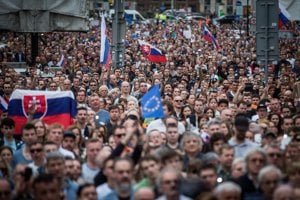The National Criminal Agency (NAKA) invited Czech investigative journalist Pavla Holcová, close collaborator of murdered journalist Ján Kuciak, for a hearing on May 15. They worked together on an unfinished story on the activities of Italian mafia in eastern Slovakia.
While she thought it would be a friendly conversation to help their investigation into the murder, when she arrived at the police station, the conversation turned into a hostile interrogation, as she described for the Organized Crime and Corruption Reporting Project (OCCRP).
Following the hearing, the police seized Holcová’s mobile phone, including the SIM card. The investigators claimed that her electronic communication can help reveal the murderer. However, the explanation was vague, the Sme daily reported.
 General prosecutor: Some police chiefs act unlawfully in Kuciak investigation Read more
General prosecutor: Some police chiefs act unlawfully in Kuciak investigation Read more “It was an eight-hour, demanding interrogation,” Holcová, who runs the Prague-based Czech Center for Investigative Journalism, told Sme. “They did not properly explain to me why they need my phone.”
Meanwhile, editors-in-chief and publishers of major Slovak media outlets as well as journalists and their associations have called on police to explain their behaviour to Holcová.
Order came from the Special Prosecutor’s Office
The decision to seize a mobile phone is surprising as journalists are required to protect their information sources. This is the reason why Holcová refused to provide the police officers with codes to the phone and encryption applications. She has sensitive information there, not only on the topics she was working on with Kuciak.
The police will now try to break the codes, Sme wrote.
The order was issued by the Special Prosecutor’s Office, which requires information necessary for the investigation. It stressed that Holcová handed in her phone voluntarily, which it explains with the fact that everybody signed a report from the hearing.
 Five things that the murders of Ján Kuciak and Martina Kušnírová have changed Read more
Five things that the murders of Ján Kuciak and Martina Kušnírová have changed Read more “We stress that the objective of receiving this communication was to obtain objective evidence that will help investigate the crime, and not the violation of the journalist’s rights,” the Special Prosecutor’s Office said, as quoted by the Denník N daily.
However, the Czech journalist said she was forced to give it to the police. They allegedly threatened her with a fine of €1,650. She even told the investigators that she does not know details about the Slovak VAT frauds and links between influential entrepreneurs and top politicians. However, the investigator did not believe her and kept repeating the questions, as reported by the Investigace.cz website.
When she said she could not answer them, the police requested her phone.
Support from journalists
Publishers and editors-in-chief of major Slovak media outlets have expressed concern about the incident.
“The duty to protect sources is one of the basics of journalistic work,” they said in a joint statement. “It is one of the conditions under which people give journalists sensitive information that enables fundamental revelations of corruption or other state power failures.”
They referred to the valid press law that orders publishers and their employees, as well as people providing publishers with certain information based on an agreement, to keep silent about their information source, so that it is not possible to identify the sources. The same applies to an information device.
 Is Slovakia’s free press under attack? Read more
Is Slovakia’s free press under attack? Read more They stress that regarding several controversies related to police and prosecutors dealing with the case, the proper protection of sources is more important than before, particularly if there is a risk of abusing this information.
“The police and prosecutor’s office have to clearly explain their steps towards journalist Pavla Holcová, including with which law and at which extent the police and the prosecutor’s office can ask journalists about their information sources.”
They also called on the Culture Ministry to prepare legislative proposals that will strengthen the position of journalists and remove the unclarity of the current valid laws.
Foreign organisations respond too
The International Press Institute (IPI) also called on Slovak authorities to clarify the incident.
“The seizure of a journalist’s phone is a highly serious matter that endangers journalists’ fundamental right and duty to protect their sources”, said IPI Deputy Director Scott Griffen, as quoted on IPI’s website. “Slovak authorities must clarify the reason behind this disturbing interrogation and confiscation and immediately return Ms. Holcová’s device.”
Beata Balogová, editor-in-chief of the Sme daily and a member of IPI’s Executive Board, stressed that the ability to protect sources who provide sensitive information and often risk their jobs or safety, is a crucial part of the watchdog role of journalists.
“The Slovak police, by seizing the mobile phone of investigative reporter Pavla Holcová, seriously weakened this ability,” Balogová said. “It sends out signals to trusted sources that their communication with the journalists is no longer safe.”
At the same time, foreign investigative journalists associated in OCCRP have called on Slovak police to return the mobile phone.
“We’ve seen such behaviour in kidnapped countries and autocratic regimes,” they said, as quoted by Denník N, adding that it does not belong to Europe.
Meanwhile, Reporters Without Borders (RSF) also condemned the incident. It demands the return of the phone and its contents, and urges the Slovak police to focus on what they are supposed to be doing instead going after unrelated targets.
“We call on the Slovak police to return Pavla Holcová’s telephone, which was seized with the official aim of extracting information she had already given them,” said Pauline Adès-Mevel, the head of RSF’s EU-Balkans desk. “The police must refrain from going after the wrong targets. The need to investigate the double murder of Ján Kuciak and his fiancée must not be used as a pretext for harassing an investigative reporter and her sources, whose protection must be safeguarded."






